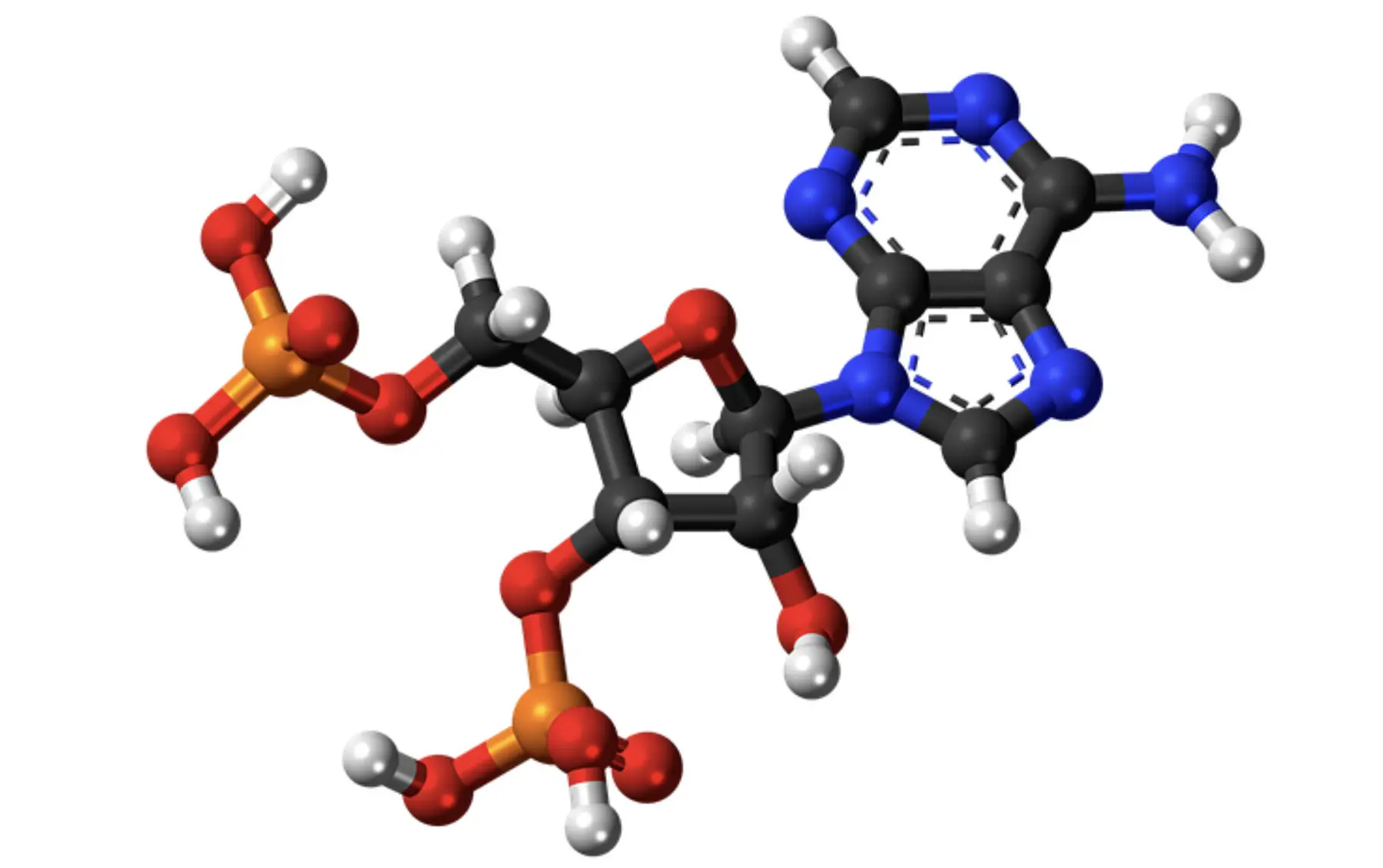The key to a better night’s sleep is managing adenosine, a naturally occurring chemical that accumulates in our bodies as a result of our daily activities. Adenosine is part of ATP (Adenosine triphosphate), the energy currency used by our bodies. Most of the adenosine is immediately recycled back into new ATP, but some of it accumulates throughout the day like loose change. The longer we’re awake, the more adenosine builds up and the sleepier we become. During sleep, adenosine levels decrease by being recycled back into ATP, allowing us to awaken feeling fresh and rested.
Our circadian rhythm, the body’s internal 24-hour clock, also plays a significant role in determining when we should feel alert or sleepy. The familiar afternoon slump or late-night drowsiness is your brain signalling that it’s time to rest and recharge.
There are factors that can interfere with our internal clock and natural adenosine response.
Watch what’s keeping you up.
For example, caffeine delays sleep by blocking the receptors that adenosine would normally attach to. This upsets our circadian timing, and as the caffeine wears off, the effects of the accumulated adenosine become more pronounced, often leading to what we experience as a “caffeine crash.”
If we want to count on a good night’s sleep, it’s important to maintain healthy adenosine responses. What can you do to help? Lots.
Physical activity increases ATP consumption, which indirectly leads to an increase in adenosine. Additionally, maintaining a balanced diet of lean proteins, vegetables, and complex carbohydrates can contribute to overall well-being, which, in turn, supports healthy sleep patterns.
NIKKI is a sleeper.
Having a NIKKI on your wrist gives you 24/7 access to technology designed to help your cell network produce the nutrients you need to maintain a high level of wellness, including the right amount of quality sleep. Think of NIKKI as a coach, leading a team of trillions of cells and reminding them to make all the right moves that make you a winner in the wellness game.
(read on)
We’re all familiar with the struggle of a sleepless night, the frustration of laying wide awake while the world slumbers on. But what if we told you that the key to a better night’s sleep could be as simple as understanding a little molecule called adenosine? This naturally occurring chemical plays a crucial role in our sleep-wake cycle, helping to regulate our sleep patterns and promote deep, restful sleep. From understanding the science behind adenosine and how it works in our brains to induce sleep, to exploring ways to naturally boost our adenosine levels, we’re going to examine the power of this remarkable molecule. Whether you’re looking for tips to improve your sleep quality or just curious about how adenosine affects your sleep, we’ve got you covered. Ready to unlock the secret to better sleep? Let’s dive in and discover the power of adenosine.
Key Takeaways
- Adenosine is a crucial molecule related to energy that also helps regulate sleep and promotes deep sleep.
- Adenosine levels increase throughout the day and induce fatigue and sleepiness.
- Adenosine binds to receptors in the brain, slowing down neural activity and inducing drowsiness.
- Maintaining a consistent sleep-wake cycle and avoiding caffeine can help manage adenosine levels for better sleep.
The science behind adenosine and sleep regulation
You might be wondering how adenosine actually regulates your sleep, and it’s a fascinating bit of science that’s worth diving into. Adenosine, an essential part of our body’s energy metabolism, also plays a crucial role in sleep regulation. As we’re awake, our bodies steadily accumulate adenosine, which enhances the desire for sleep, an effect known as sleep pressure. This buildup is a part of our sleep-wake cycle and is essential to maintain its balance.
To comprehend the power of adenosine for sleep, we need to understand how it interacts with the brain. Adenosine binds to specific receptors in the brain, namely the adenosine receptors. This binding process slows down neural activity, inducing feelings of drowsiness and ultimately promoting sleep. The longer we’re awake, the more adenosine is produced and the sleepier we become.
As we sleep, adenosine levels in the brain decrease, lessening its inhibitory effect on neurotransmitter release. This reduction in adenosine levels contributes to us feeling more alert when we wake up. This cycle of adenosine accumulation during wakefulness and decrease during sleep repeats daily, underscoring the essential role that adenosine plays in regulating our sleep-wake cycles.
So, next time you’re struggling with sleep, remember the power of adenosine. It’s our body’s natural way of telling us when it’s time to rest.

Understanding the sleep-wake cycle
Ever wondered about the mysterious dance between waking and dreaming that your body performs every day? This intricate process is governed by the sleep-wake cycle, a natural rhythm that balances your need for both sleep and wakefulness. Adenosine, a neurotransmitter, plays a pivotal role in this dance of sleep-wake regulation.
The dynamics of sleep revolve around two key forces: circadian rhythms and sleep homeostasis. Your circadian rhythm, your body’s internal 24-hour clock, aligns with the day-night cycle, guiding when you should feel alert or sleepy. Sleep homeostasis, on the other hand, monitors your need for sleep based on how long you’ve been awake. The longer you’re up, the more adenosine accumulates in your brain, promoting sleep. This is where adenosine steps in.
Through adenosine receptor stimulation, adenosine promotes sleep by signaling the brain that it’s time to rest. This process is crucial for the body’s restoration and rejuvenation. By understanding the sleep-wake cycle and the role of adenosine, we empower ourselves to take control of our sleep health and embrace the freedom of well-rested days. So, don’t underestimate the power of adenosine and the sleep-wake cycle. It’s the key to unlocking the mystery of restful sleep.
Adenosine receptors and their role in sleep
It’s these tiny chemical doorways in our brains, known as receptors, that play a starring role in our nightly descent into slumber. Specifically, adenosine receptors, which react to the fluctuating extracellular adenosine levels, are pivotal in regulating our sleep-wake cycle.
To better appreciate these microscopic sleep facilitators, let’s consider the following:
- Adenosine receptors are protein structures that react to adenosine, a biochemical compound integral to our energy metabolism.
- Extracellular adenosine levels increase during wakefulness and decrease during sleep.
- Adenosine receptor antagonists, like caffeine, block these receptors, preventing adenosine from inducing sleepiness.
- Adenosine receptor antagonism is a mechanism targeted by many sleep-modifying drugs.
- The enzyme adenosine deaminase breaks down adenosine, influencing the availability of adenosine for the receptors as a side effect.
Understanding the role of adenosine and its receptors in sleep regulation empowers us with knowledge. It allows us to make informed decisions about our sleep habits and potential interventions. If we desire the freedom to control our sleep, understanding the role of adenosine is a step in the right direction. Without a doubt, the power of adenosine in sleep regulation is a fascinating and significant aspect of our biological clock.
How adenosine levels increase throughout the day
As your day progresses, an interesting thing happens inside your brain – the levels of a certain biochemical compound start to rise. This compound is adenosine, a by-product of adenosine triphosphate (ATP) metabolism. As we engage in physical and mental activities, our cells burn ATP for energy, which is then broken down into adenosine diphosphate (ADP) and adenosine monophosphate (AMP).
Both ADP and AMP are further metabolized to produce adenosine, which is then released into the extracellular space in the brain. This accumulation of adenosine is influenced by various factors, including the breakdown of ATP, ADP, and AMP. While these processes are extremely efficient, they are not 100%, so some adenosine is left over and begins to accumulate. As adenosine levels rise, they bind to specific adenosine receptors in the brain, inducing feelings of fatigue and promoting sleepiness.
Understanding the correlation between adenosine metabolism and our sleep-wake cycle empowers us to take control of our rest patterns. So, when you feel that afternoon slump or late-night drowsiness, remember it’s your brain signaling you that it’s time to rest and recharge. It’s a beautifully orchestrated biochemical dance, with adenosine playing a leading role.

The connection between adenosine and deep sleep
Did you know that your sense of overwhelming exhaustion at the end of a long day has a direct link to the depth of your slumber at night? It’s true, and it all has to do with adenosine, a neurotransmitter that promotes sleep.
Throughout the day, adenosine levels in our brains gradually increase, creating a sense of fatigue that can only be alleviated by sleep. This exhaustion is a cue for our bodies to enter into delta (slow-wave) sleep, a phase of deep, restorative rest. During this period, sleep-active neurons begin to function, facilitating the transition into sleep.
The connection between adenosine and caffeine
Having explored the role of adenosine in deep sleep, let’s now shift our focus to its relationship with caffeine. It’s no secret that many of us rely on our morning cup of joe to kick-start the day. But have you ever wondered how caffeine works to counteract sleepiness?
Caffeine’s secret lies in its ability to block adenosine receptors in the brain. Adenosine, as we’ve discussed, is crucial for sleep-wake regulation. It gradually builds up during the day, creating a homeostatic sleep pressure that eventually leads us to sleep. However, when we consume caffeine, it effectively mimics adenosine and binds to its receptors, blocking them from being activated. This results in caffeine-induced wakefulness, as the homeostatic sleep pressure is temporarily reduced.
Keep in mind, though, that caffeine merely delays the onset of sleepiness without reducing the need for sleep. It interferes with our circadian timing, and as it wears off, the accumulated adenosine rushes back in, often leading to a “caffeine crash.”
So, while caffeine can be a useful tool for temporary alertness, it’s essential to respect the natural rhythm of our bodies and the powerful role of adenosine in our sleep cycle.
Natural ways to increase adenosine levels for better sleep
You might be wondering how you can promote better rest without reaching for that nightly cup of chamomile tea or popping a melatonin pill. The answer lies in the power of adenosine, a neurotransmitter that plays a significant role in the homeostatic sleep response, helping regulate your sleep-wake cycle.
A common cause of sleep disorders is sleep deprivation. When we don’t get enough sleep, our adenosine levels can fall out of balance, causing difficulty falling asleep and maintaining a regular sleep pattern. To counter this, we can take natural steps to increase our adenosine levels.
Regular exercise is one effective strategy. Physical activity increases adenosine production as a byproduct of ATP metabolism, encouraging a natural sleep response. Additionally, maintaining a balanced diet based on foods like lean proteins, vegetables, and complex carbohydrates also contributes to general wellness and stable energy levels.
Mindfulness practices, such as meditation and yoga, have been shown to improve sleep quality by contributing to relaxation and may help prepare the body for sleep by reducing stress hormones and promoting a calm mental state. A healthy sleep pattern isn’t solely about the ability to fall asleep quickly; it’s also about maintaining a consistent sleep-wake cycle. Engaging in natural practices like mindfulness can complement the role that adenosine plays in facilitating sleep, helping you achieve a more restful and restorative sleep experience.

Tips for improving sleep with adenosine
Struggling to catch those elusive Z’s? Let’s dive into some practical tips that can help enhance your rest by increasing those crucial neurotransmitter levels.
To start, we need to consider the role of adenosine in sleep control. This neurotransmitter builds up in our bodies throughout the day, driving the need for sleep. Therefore, managing our adenosine levels is a vital aspect of sleep health. One way to do this is by avoiding caffeine in the late afternoon and evening. Caffeine blocks the effects of adenosine, making it harder for us to fall asleep.
Next, let’s consider acute sleep deprivation. If we’re consistently not getting enough sleep, our bodies will try to compensate through what’s known as recovery sleep. This is essentially our system’s way of making up for lost sleep by increasing adenosine levels.
Lastly, engaging in regular physical activity can promote better sleep. Exercise increases the metabolism of ATP resulting in more free adenosine, helping to create a healthy sleep-wake cycle.
So, let’s gear towards these simple changes. They can aid in managing adenosine levels for a better night’s sleep, offering us the freedom of waking up refreshed and ready to seize the day.
How to use NIKKI to boost your sleep routine
Adenosine for sleep
Embracing NIKKI as part of your bedtime routine can make the dream of a truly restful night no longer just a dream. Adenosine, a fundamental player in our sleep-wake cycle, has the power to transform our sleep quality. NIKKI’s sleep programs help us achieve these powerful benefits at our fingertips.
Conclusion
Far from being just an energy use byproduct, adenosine serves as a powerful tool to promote sleep. It’s instrumental in helping us get deep, restful sleep – critical for maintaining a healthy body and immune system. By understanding its role and finding ways to naturally regulate our adenosine levels, we can significantly improve our sleep quality. Let’s make the most of this knowledge and incorporate it into our sleep routines for healthier, more restful nights.
Frequently Asked Questions
Does adenosine help you sleep?
Yes, adenosine plays a significant role in sleep physiology. It accumulates in the brain after physical activity and during prolonged wakefulness and acts on specific adenosine receptors to reduce neurotransmitter release, thereby promoting feelings of sleepiness. Through its action on the central nervous system, adenosine prepares the body for subsequent sleep.
Is adenosine like melatonin?
While both adenosine and melatonin are involved in sleep regulation, they operate through different mechanisms. Melatonin is closely tied to your circadian clock and helps prepare your body for sleep, partly by lowering body temperature. Adenosine, on the other hand, accumulates during periods of wakefulness and acts on specific receptors in the brain to reduce neurotransmitter release, thereby promoting feelings of sleepiness.
What does adenosine do to the brain?
Adenosine acts on the central nervous system to promote feelings of sleepiness. It works by binding to specific receptors in the brain known as the basal forebrain, leading to reduced neurotransmitter release and promoting a state conducive to sleep. As adenosine levels rise, they trigger the onset of slow wave brain activity, leading to deeper sleep, as well as affecting Rapid Eye Movement sleep cycles (REM sleep). This balance is called normal sleep homeostasis.



